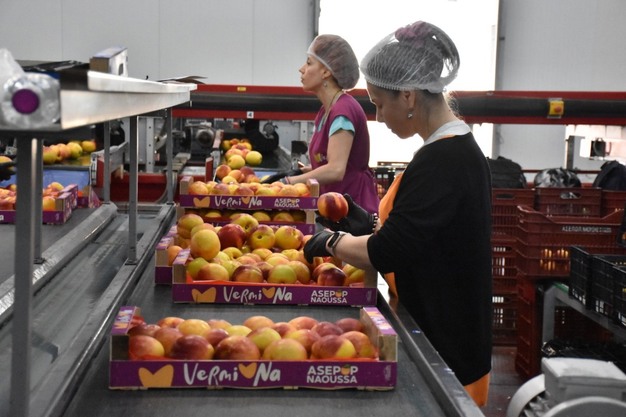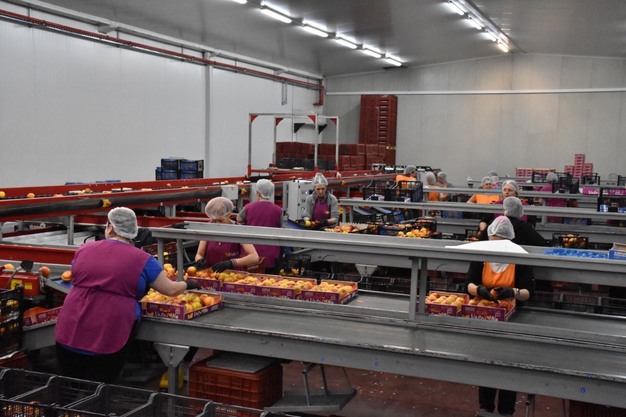Greek cooperative ASEPOP Naoussa has 450 members and markets its peaches and nectarines under the Vermina brand. Production has already recovered from the initial low productivity that marked the beginning of the season, and the packing house has been operating at full capacity. However, this translated into commercial pressure, explains Mr. Vassilis Bougas, the cooperative's director.
As he describes: "The season has gotten a bit messy toward the end. It started off very well because there were low volumes due to the frost. After the buyers' initial reaction, where they think you don't want to sell to them, they eventually realize that there's a product shortage, and that pushes prices upward. However, since the end of July, prices have been under downward pressure, and as we speak, peaches are selling at one euro per kilo, with nectarines fetching slightly more."
 © ASEPOP Naoussa
© ASEPOP Naoussa
There are several reasons behind this shift in pricing: "The availability of our own product has now increased by 60% compared to earlier in the season. The late-season varieties were spared by the spring frost, and we are now loading at normal volumes. At the same time, cheaper peaches are now on the market. Georgia and Armenia are exporting to some of the same markets we supply. We had to withdraw from those markets because the prices didn't work out, and we had to push some other markets to take more volume. Ukraine is one of the markets where prices have come under serious pressure. Lastly, consumers are also turning their attention to other products that came out later, such as grapes."
When table peaches were scarce, some traders were distributing cling peaches in the fresh market. ASEPOP Naoussa refused to supplement its loads with such peaches. "We didn't put in any cling peaches. It's a big mistake because you're killing both the quality and the market. The buyer sees cheap cling peaches and, even though he knows what they are, ends up thinking the person who sold him the table peaches at a higher price tricked him. Later, when he sees the difference in quality, he realizes the mistake—but by then, you've already lost 10 to 15 days. They were asking us for cling peaches, and we refused to send them. We knew that later they would complain about the quality." Mr. Bougas stresses.
 © ASEPOP Naoussa
© ASEPOP Naoussa
Meanwhile, fruit sizing is currently producing large calibers. "The area is known for its large-sized fruit, which is mostly intended for the domestic market. These sizes are commercially unsuitable for export. European markets traditionally prefer smaller peaches because with a large one, if there's any spoilage, you're throwing away 300 grams in one go. Plus, Europeans struggle to eat a 4A peach—it's just not part of their food culture," comments the director of the Greek cooperative.
He adds, "One thing that remains constant is the positive reception of the Vermina brand. Buyers specifically ask for the fruit in the branded crates with the Vermina sticker. If we try to send the fruit without the brand, even if we explain that it's still ours, the clients don't want it."
For more information:
Vasilis Mpougas
ASEPOP Naoussa
Tel: +30 23320 43206
Mob: +30 69791 17397
Email: [email protected]
https://www.asepopn.gr/en/
